- Philip Norman’s “letter” to Paul - May 2, 2016
- The Jets and The Beatles - April 25, 2016
- Lennon and McCartney On The Tonight Show, 1968 - April 20, 2016
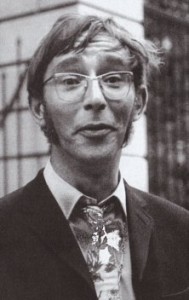
Alistair Taylor, 1967
In 1960, Alistair Taylor was a newly married 25-year-old office clerk when he applied for a sales job at NEMS. He had never met Brian Epstein before, but the two men hit it off immediately. The sales job morphed into an offer to be Epstein’s personal assistant, and Taylor jumped at the chance.
If you’re looking for a Lewisohnian-type account of Beatle history, this isn’t the book to read. Taylor is charmingly unsophisticated and his recollections are quirky and hyperbolical (and sometimes a little suspect). But hey– that’s part of the book’s (and the author’s) charm.
The Gay Thing
Taylor’s adoration of Brian Epstein was immediate, as was his apparent instinct that Epstein was gay. He made much of that first meeting, if only to assure the reader that a) he knew Brian was gay, b) Brian knew he knew, c) he knew Brian knew he knew, and d) they both knew Taylor was straight. (Whew.)
Taylor’s unspoken but obvious era-bound discomfiture about homosexuality seems to have shaped his understanding of most situations in which Epstein’s homosexuality probably played a role. When speaking of Epstein’s first visit to the Cavern, for example, Taylor states:
I don’t believe for a second the endlessly repeated view that he fell hopelessly in love with John. He fell in love with their sheer, energy, wicked humour and irresistible charisma.
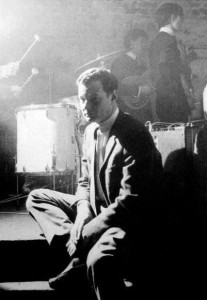
Brian Epstein at the Cavern
It would seem improbable to most people that an older, successful businessman with no interest in pop music, and no previous experience as an impresario, would suddenly decide to manage a pop group on the strength of one energetic performance; but Taylor is quite insistent that there were no sexual undertones in Epstein’s interest. He is similarly dismissive of the rumours surrounding the Lennon/Epstein trip to Spain:
John roared with laughter at the rumours that began afterwards. Typically, he encouraged the stories that he and Brian were gay lovers because he thought it was funny… [but] he told me after in one of our frankest heart-to-hearts that Brian never seriously did proposition him. He had teased Brian about the young men he kept gazing at and the odd ones who had found their way to his room. Brain had joked to John about the women who hurled themselves at him. “If he’d asked me, I probably would have done anything he wanted. I was so much in awe of Brian that I’d have tried a night of vice-versa. But he never wanted me like that. Sure I took the mickey a bit and pretended to lead him on. But we both knew we were joking. He wanted a pal he could have a laugh with and someone he could teach about life. I thought his bum boys were creeps and Brian knew that. I couldn’t shag a bloke, and I certainly couldn’t lie there and let one shag me. Even a nice guy like Brian. To be honest, the thought of it turns me over”.
Taylor never reconciled this John Lennon who “roared with laughter” and “encouraged the stories” about his rumoured homosexual behaviour with the other John Lennon who practically killed Bob Wooler for the same reason. One gets the impression that Taylor portrayed the Lennon/Epstein friendship in heteronormative terms because that was more palatable than the alternative. One also senses that Taylor may have harboured (unacknowledged) romantic feelings about Epstein himself. In speaking about Brian Epstein, Taylor says this:
There was a chemistry between us right from the start that is very, very hard to explain. My wife Leslie reckons I was in love with him. I did love him, but not in a homosexual way. The idea of going to bed with Brian, or with any man, makes me physically sick. It always has. But in a non-physical way, I still loved Brian. He was bright and funny and brilliant. He simply oozed charisma. Brian Epstein brightened up any room he walked into, he couldn’t help it. We just hit it off straight away. There was something about Brian that inspired loyalty and devotion in me. I think he knew that. And he also knew that those qualities were not going to be found in any of the men he slept with.
Meet the Beatles
Alistair Taylor had great affection for the Beatles, especially John and Paul, with whom he became particularly close. Of the two men, he says,
forget what happened later, at that time, they were closer than any two men I’ve ever known. John and Paul were like brothers. In fact, they were a lot closer than most brothers. John and Paul, as well as being the driving force of the group in those exciting early days, were the firmest of friends. People who talk about the early conflicts are mainly talking crap. It’s Lennon who had become the most misunderstood. I’m not saying he was a saint, but to me he was a hell of a nice guy. He has been signed off as being the hard man, and cruel to women, brutal to Brian. But he could be so gentle. He was the biggest piss-taker the world has ever known. But there was a gentle side to John. [He] was a special guy and I suppose I always felt the most protective of him. Somehow he was more vulnerable than the others because he did wear his heart on his sleeve sometimes. He needed looking after.
As “Mr. Fixit” for the band, Taylor was privy to the Beatles’ personal indiscretions, and there were many. On one occasion, he found himself in the unenviable position of standing face to face with a pregnant teenager and her irate parents, who marched her into NEMS one day and demanded to speak to someone about John Lennon. Taylor had the parents cool their heels (and keep their mouth shut) until a meeting with Brian could be arranged. (Side note: This is very similar to a story about Paul McCartney, and I think Taylor may have mixed them up. At any rate, Epstein didn’t want to dispute the paternity and agreed to pay the girl 250 pounds a week until the baby was 16, in exchange for the family’s silence.)
On another occasion, Taylor tells the story of how Derek Taylor arranged a sexual rendezvous between Lennon and his boyhood heart-throb, Brigitte Bardot. John had apparently steeled himself, so to speak, for the occasion by consuming copious amounts of drugs and alcohol, only to find he was “too stoned to rise to the occasion:”
She was keen enough and we played around a bit but when I needed my biggest erection there was just….nothing. Very embarrassing. I tried to tell her nothing personal but what could be more personal than that?”
The unimaginable availability of young women reportedly lost its appeal to Lennon, with whom Alistair Taylor had many heart-to-heart chats. Taylor recounts this particular conversation he had with John, who by 1965 was feeling personally disenfranchised by fame:
When I was a kid, I wanted to shag every attractive woman I saw. I used to dream that it would be great if you could just click your fingers and they would strip off and be ready for me. I would spend most of my teenage years fantasizing about having this kind of power over women. The weird thing is, when the fantasies came true they weren’t not nearly so much fun. …The first time it was sensational. The second time it got to feel like I was giving a performance. You know how when you make love to a woman [and] that moment you come, you get a buzz of relief and just for a moment you don’t need anyone or anything. The more women I had, the more that buzz would turn into a horrible feeling of rejection and revulsion at what I’d been doing. As soon as I’d been with a woman, I wanted to get the hell out.
Taylor’s relationship with Paul McCartney, as least at first, was much less introspective. After furnishing his Scottish retreat (second-hand furniture only, requested Paul), Taylor spent many leisure hours there with McCartney and Jane Asher. It wasn’t until McCartney’s break with Asher, and his estrangement from the other Beatles, that Taylor’s role as in-house Beatle Buddy became more therapeutic than recreational. According to Taylor, he became a primary source of solace for Paul, who “cried on his shoulder” over his break-up with Asher and mourned the memory of how he “talked to Jane about all the stuff” surrounding his mother’s death.
Paul’s frame of mind did an upturn when he met Linda Eastman, but in spite of his friendship with Paul, Alistair Taylor was not impressed. He disliked her immensely, and at least on two occasions was accused by Linda of lining his own pockets at Paul’s expense. This effectively ended his personal relationship with Paul, and presaged what was to come.
The Death of Brian Epstein
According to Taylor, Brian Epstein “didn’t want to know about Apple”, although he was on its executive board, perhaps just to appease the four Beatles. About Epstein’s death, Taylor is unequivocal in his belief that although often depressed and far too reliant on prescription medication, Epstein looked forward to his future and never intended to harm himself (and indeed, autopsy findings revealed that Epstein’s death was caused by the accidental cumulative effects of Carbitrol, a barbiturate prescribed for sleep). Taylor was asked by Clive Epstein to stay on as General Manager of Nems, a role he assumed in 1963.
When Allen Klein came on the scene, Alistair Taylor found him gauche and unapproachable. (Klein, he said, “had all the charm of a broken lavatory seat”.) He was flabbergasted when Peter Brown told him he had been fired. Taylor’s first thought was to phone his four friends “just to be sure they knew what was going on.” He didn’t hear back, and right up to his death a year after his book was published, his heart was still broken.
Interesting Factoids:
- Alistair Taylor was solicited by John Lennon to buy him an island at least “two hours from London.” Taylor snared him an island called Dorinish. (You may remember this island from the book, Beatlebone.)
- Taylor claims he was the “Raymond Jones” that requested My Bonnie. According to Taylor, Epstein prided himself on having every record available, and when fans wandered in asking for My Bonnie, Taylor said he put the order in under a pseudonym. This story, however, was refuted by a number of people, including Raymond Jones himself.
- During the Magical Mystery Tour after-party, a drunken Freddie Lennon did a face-plant on stage to thunderous applause.
- When John and Brian were in Spain, they were joined one night for dinner by a young American couple on their honeymoon. Incessant and shameless flirting ensued between Lennon and the young bride. When the young bride excused herself to use the ladies’ room, John followed. They returned to the table sometime later post-coitus to a clueless husband and an amused Epstein.
- After Alistair Taylor was shit-canned by Klein, he went to work for Dick James at DJM records. His first job was doing P.R. for a young man by the name of Reggie Dwight, who later became famous as Elton John.
- Taylor tells an interesting story about the young Beatles and their developing business sense. According to Taylor,
Brian would issue their financial statements, all neatly and accurately itemized, and sealed in a white manilla envelope. John would instantly crumple it up and stuff it in his pocket. George might have a look. Ringo certainly couldn’t understand it and didn’t waste time trying. Paul was the one who opened it carefully and would sit in the corner of the office for hours going meticulously through it. He would read every detail and question Brian on anything he didn’t understand.
Harbinger of things to come, I’d say.

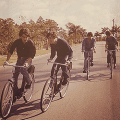
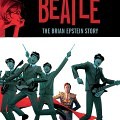
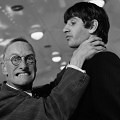
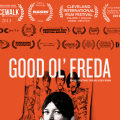

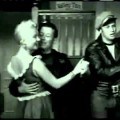
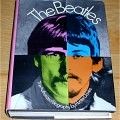
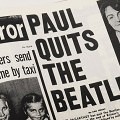
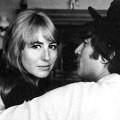
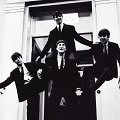
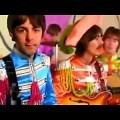
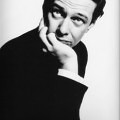
It sure seems like there was a lot of love flowing in the Beatles’ circles, amirite? Alistair was in love with Brian, Brian was in love with John and later with Paul, John and Paul were in love, John was in love with Stu, Stu and Astrid were in love, Klaus was briefly in love with Astrid, Jurgen was in love with George, everyone was in love with Patti Boyd. 😉 Not to mention all the actual married couples. And others I’m sure I’m missing… Sounds like one big giant lovefest!
Ha ha yes! And as a couple of brilliant songwriters once wrote “All you need is love.”
And , “And in the end, the love you take is equal to the love you make.”
The second shortest verse in the bible says. “God is love”
….and George had an affair with Maureen Starr, and Pattie married Eric Clapton, who at the time was George’s bestie….Yup, whole lotta lovin’ going on. 🙂
“The more women I had, the more that buzz would turn into a horrible feeling of rejection and revulsion at what I’d been doing.”
This is a total bummer, but sounds 100% believable to me.
Also, am I reading correctly… that Paul was crying about Alistair’s mom’s death? Dude, that is one tender-hearted mf. Also, 100% believable to me.
Paul was crying about his breakup with Jane Asher. He told Alistair that he had told Jane about his hidden feelings over his mother’s death, meaning he had been very close to Jane and had let down his guard with her.
“Also, am I reading correctly… that Paul was crying about Alistair’s mom’s death?”
I believe its post-Jane breakup Paul telling Alistair how much he, Paul, confided in Jane when the two of them were together. This included Paul telling Alistair that he had told Jane a great deal about his mother’s death, and how it affected him. Taylor is very much in the anti-Linda pro-Jane contingent of Beatles insiders — I think its either he, or Peter Brown, who labeled Linda a “hard faced star chaser” — and he was emphasizing how close the Paul/Jane relationship was, and how devastated Paul was when Jane broke the engagement.
He was crying about his own mother’s death. I’ll try to correct the truncated sentence (serves me right for posting at 2 in the morning.)
Thanks for clearing up the controversy surrounding the exact cause of Paul’s tears. 😉
You heard it here, folks! 🙂
There is a biological reason for this. After orgasm, the male brain produces oxytocin and prolactin, which causes the refractory period and quells sexual desire temporarily. If it’s too strong, it can feel like revulsion.
These chemicals can help create bonding; but in sex where bonding is not possible or desired, you might just get the icky parts.
Is it your belief, Mike, that biology is accounting for John’s experience? It struck me, reading it, that it was entirely emotional.
(It’s interesting, as a side note, about oxytocin. Women produce it as well, but yet it doesn’t result in a refractory period. Wonder if it’s the oxytocin/prolactin combo.)
I’ve heard that prolactin is the major culprit in the refractory period; it was only in the research for the comment that I saw that oxytocin was also part of it.
I think that biology is a big part of what John was experiencing, yes — and I expect that it’s not uncommon in cases of sexual oversupply. But of course there was a huge emotional part too.
Interesting. Something I hadn’t considered before.
Alistair Taylor was solicited by John Lennon to buy him an island at least “two hours from London.” Taylor snared him an island called Dorinish.
I didn’t know they went as far as actually purchasing the island. I thought it was just something they talked about.
As weird as buying an island sounds, there’s actually a precedent for this. The writer/critic Alexander Woollcott bought Neshobe Island, and used it as a retreat for friends like Harpo Marx and actors, artists & writers.
I think John would have been better off on an island like Dorinish instead of the Dakota. Healthier, safer, and he could ride a sail boat and play Captain.
Also, where is the John (or) Paul love child now? Did this baby inherit the music gene? No one ever came forward? It’d make a great memoir: “250 Pounds A Week – My Story”
They did indeed. It was sold later for use as a sort of quasi-hippie commune. And I also wonder how many little baby Beatles have populated the earth since the early 60’s. 🙂
This was an interesting book. I read it a few years ago. He got quite a few things wrong though. He mistook Maggie Mcgivern for a “waitress” that Paul met in some pub and had a one night stand with. She was a professional model and actress who had appeared in the movie Blow Up and had a three year affair with Paul, and almost married him. Don’t know how Alistair missed all that. Also I’m wondering if he might have confused Paul with George when he said, ‘Paul was the one who opened it carefully and would sit in the corner of the office for hours going meticulously through it. He would read every detail and question Brian on anything he didn’t understand’. I know Paul was the most meticulous but I’ve always heard it was George who was obsessed with the money side of things. Anyway I can’t picture any of them “sitting in the corner for hours” going over anything that wasn’t songwriting or guitar playing. I find it absurd and he had to have mis-remembered that. Also there’s a comment in the book where Alistair declares that John was a genius but Paul was not. I found it ridiculous that Alistair appointed himself expert on who’s a genius and who is not. What a stupid thing to say. Why is John a genius? Why is Paul not a genius? And in the context of songwriting and composing what is a genius? His comment reminds me of a little boy declaring that Spider-Man is more powerful than Superman.
I know–poor ole` Alistair gets so much wrong that THAT would fill an entire post. 🙂 I find his memoirs interesting in that there’s data to be mined even within his muddled narrative.
FWIW, Karen, I think this is an awesome review. I don’t think there’s any need for us to take Alistair too seriously. 🙂
Thank you Chelsea.
“Also there’s a comment in the book where Alistair declares that John was a genius but Paul was not. I found it ridiculous that Alistair appointed himself expert on who’s a genius and who is not. What a stupid thing to say. Why is John a genius? Why is Paul not a genius? And in the context of songwriting and composing what is a genius? His comment reminds me of a little boy declaring that Spider-Man is more powerful than Superman.”
Your spiderman/superman comment made me laugh, linda. That is what so much of the John vs. Paul debate boils down to; subjective speculation and partisanship masquerading as authoritative analysis.
Let’s abandon the insolubility of defining exactly what a “genius” is anyway, and ignore the term’s subjectivity, and evaluate Alistair’s declaration and credibility as a source while contrasting him with another primary source which argues the opposite conclusion regarding Paul’s genius. Here are some source analysis 101 questions:
Alistair Taylor:
“How near was this person to the event in time and space?” A member of the Beatles inner circle, although more as a mister fix-it than any creative capacity.
“How available was evidence to this person?” Somewhat. I don’t know how much evidence, if any, Taylor supplied in his memoirs to buttress his claims.
“How competent was this person to understand the event, including training, experience, class and cultural differences?” Does Taylor have any musical training? Was he in the studio, or present at many of John and Paul’s songwriting sessions? Did he consistently witness the Beatles in the act of creation? If not, that weakens his declaration which is, after all, based on assigning superiority to musicians.
“What reasons for bias do they have?” Paul’s refusal to rescue Taylor after having been fired by Klein was perceived by Taylor as a betrayal that deeply stung.
“Have they supplied testimony on the same subject which has been disproven?” His memoirs, as noted, contain numerous errors.
“Does the source make generalizations but fail to provide evidence and examples to support them?” Yes.
Same analysis, applied to George Martin, who has repeatedly and consistently, for the past fifty years, argued in favor of Paul’s genius:
Nearness: Key Beatles insider, certainly more essential to the Beatles than Taylor.
Availability of Evidence: Witnessed and participated in the creation of every album, accompanied the Beatles on tour; socialized with them outside work.
Competency: Musician, composer, producer. Active participant in the creative process; witness to the Lennon/McCartney songwriting process and studio process. Far, far superior credentials to Taylor’s.
Bias: An unproven but reasonable assumption that Martin’s post-breakup testimony may favor McCartney, given Lennon’s criticisms of Martin and Martin’s own personal relationship with McCartney. However, Martin’s evident fondness for Lennon in numerous retrospective interviews should also be noted.
Previously errant testimony: I’m certain minor examples exist, but I can’t think of any. (With the exception of Martin’s affair playing a role in the Beatles signing, that is).
Generalizations: No. When Martin discusses McCartney’s genius (of Lennon’s) he offers evidence; explaining why he considers them such.
I look at those sources as a professional historian, and there’s no doubt in my mind which source is more credible.
Ruth, you’re one of my mostest bestest favourite historians ever. 🙂 I want to supply your criteria to Beatle neophytes everywhere.
One of the most amusing (to me, at least) aspects about Taylor’s remembered conversations is that they all sound remarkably like something Taylor would say himself.
Alistair Taylor strikes me as an odd little fellow, full of heart and good intentions–qualities which likely endeared him to Epstein and The Beatles in the first place. On his interpretation of events, however? One has to consume massive amounts of salt.
“Ruth, you’re one of my mostest bestest favourite historians ever. 🙂 I want to supply your criteria to Beatle neophytes everywhere.”
That’s why they pay historians the big money. 🙂 I do think there are attempts at source analysis in Beatles fandom (and by a few Beatles authors) but they suffer from lack of an official framework. For example,
“The Beatles Bibliography,” by Michael Brocken and Melissa Davis, does an excellent job of assigning credibility to certain works (excellent,
IMO, in that I agree with many of their conclusions, particularly regarding Norman, Spitz, Coleman and Goldman) but what they *don’t* do is provide the standards they are judging the works by.
Your note about Taylor’s remembered conversations sounding a great deal like Taylor himself was also something I noticed in your report. I think that’s true for a lot of these memoirs which came out years later; how many people recall conversations, word for word, ten years after they happened? Reporters were at least transcribing or recording the conversations.
That’s why they pay historians the big money. 🙂
Historians and practitioners of psychology both. 😉
Your comment about a framework within which one may evaluate source data reminds me of one that we use in my neck of the woods. Our two fields of study use many of the same tools and have similar orientations to data gathering.
Was he in the studio, or present at many of John and Paul’s songwriting sessions? Did he consistently witness the Beatles in the act of creation
Ruth I don’t remember him saying he was ever in the studio while they were creating. I doubt it because everyone was discouraged from being in the studio. His comment came on the heels of a story he told about being in the room while Paul was writing Hello Goodbye. He had asked Paul if songwriting was hard. Whenever they were asked that question the songwriting Beatles always answered, ” No anyone can do it.” I’ve always found their answer to be a mixture of humility, sincerity, and youthful naivety. No of course not just anyone can write a song, but it came so easily to them that they really seemed to believe they weren’t doing anything so special that anyone couldn’t do it. So Paul gave his usual answer then told Alistair to sit down next to him at the piano and told him to call out the opposite word to every word Paul sang. Hence Hello Goodbye was created. This incident alone seems to be what compelled Alistair to come to his ‘genius’ /not ‘genius’ conclusion. He never witnessed John’s songwriting, nor did he seem to witness any of Paul’s songwriting other than this little exercise at the piano. Anyway great comment Ruth.
Here’s an excerpt from Taylor’s book, regarding that question:
So it sounds like Taylor had occasion to be present during recording time, but it’s improbable that he understood what was happening with any sophistication. He had no subject-matter expertise, and was rather unsophisticated about people anyway.
Thanks for the context, linda. I do think the apparent ease with which Paul writes and creates has reinforced the perception of him as a not-genius, given how it contradicts the whole stereotype of the tortured genius, suffering for his art and agonizing over it. Which was very much the image John was selling during the breakup. “Genius is pain.”
At the risk of sounding ignorant, I think the idea of artistic genius -as a quantifiable, evidence-based thing- is kinda childish and stupid. Is there any scientific basis for the theory of (artistic) genius?
Of Brian, Taylor says: “He was bright and funny and brilliant. He simply oozed charisma.”
—
I guess I’m one of the few people who doesn’t see anything particularly charismatic about Brian. I’ve seen interviews and footage and he just looks like a dweeb to me. I’ve never found him particularly attractive or elegant or any of the other things peopel say about him. To me he always looks like that nerdy-looking type who is desperate to hang with the cool kids.
I don’t know whether you’re male or female Drew, but maybe men found Brian more charismatic than women? (If you’re male, then I’m wrong. 🙂 )
Maybe Brian’s charm and charisma doesn’t translate well in film. He does have a certain dash, I think, but beauty’s in the eye, and all that.
@Drew: I always felt the same way about Patti Boyd. I’ve never found her especially attractive, and yet everyone seemed to be mesmerized by her (even Cynthia Lennon sounded like she had a girl-crush on Patti). I just assume it’s because Patti was just a super cool person.??
Last year we became addicted to a British TV comedy “The Old Guys” and Jane Asher plays an older lady who the old guys are infatuated with. I actually didn’t recognize her for a long time until one day I noticed her name in the credits.
Pattie Boyd seemed to captivate everyone. She must have some sort of “it” factor.
Also, I mentioned this in an earlier thread, but the lady who played the Dowager’s maid in Downton Abbey, the maid who feuded with Spratt the butler/advice columnist, used to work for Brian Epstein.
I don’t know why I find that sort of stuff interesting. Can you imagine the stories she could tell?
Chris O’Dell’s memoir, “Miss O’Dell,” is an unabashed “ode to Pattie.” Everything about Pattie is wonderful; she’s fashionable, calm, intelligent, thoughtful, patient, artistic, gorgeous, etc. Eric Clapton comes off as a complete Neanderthal, and while the overall picture of George is balanced, he’s always the bad guy when it comes to disagreements with Pattie. O’Dell is still friends with Pattie, which might be why her portrayal is so one sided.
Tony Bramwell is the most anti-Pattie Beatles insider I’ve read. He blames her entirely for the eventual Harrison/Boyd split, and argues that, during the first few years of their marriage, poor George rattled around his mansion, all lonely, while Pattie caroused in London, flirting. The damage caused by George’s numerous and occasionally flagrant infidelities is never mentioned.
Oops! Sorry folks, I should have put the above comment on John Lennon-Man of the Decade post. I don’t know how I got it turned around other than I woke up, still sleepily got on computer, got distracted and mixed up. Whatever. I’m gonna repeat this comment on the Man of the Decade thread.
[edited to add–Water Falls–I deleted it from the Alistair post as per your comment above. 🙂 Karen]